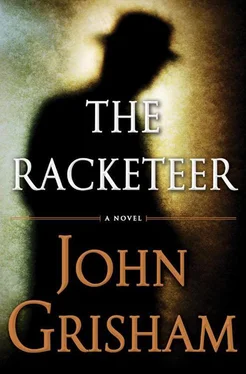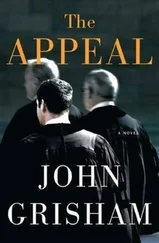John Grisham - The Racketeer
Здесь есть возможность читать онлайн «John Grisham - The Racketeer» весь текст электронной книги совершенно бесплатно (целиком полную версию без сокращений). В некоторых случаях можно слушать аудио, скачать через торрент в формате fb2 и присутствует краткое содержание. Жанр: Криминальный детектив, на английском языке. Описание произведения, (предисловие) а так же отзывы посетителей доступны на портале библиотеки ЛибКат.
- Название:The Racketeer
- Автор:
- Жанр:
- Год:неизвестен
- ISBN:нет данных
- Рейтинг книги:4 / 5. Голосов: 1
-
Избранное:Добавить в избранное
- Отзывы:
-
Ваша оценка:
- 80
- 1
- 2
- 3
- 4
- 5
The Racketeer: краткое содержание, описание и аннотация
Предлагаем к чтению аннотацию, описание, краткое содержание или предисловие (зависит от того, что написал сам автор книги «The Racketeer»). Если вы не нашли необходимую информацию о книге — напишите в комментариях, мы постараемся отыскать её.
The Racketeer — читать онлайн бесплатно полную книгу (весь текст) целиком
Ниже представлен текст книги, разбитый по страницам. Система сохранения места последней прочитанной страницы, позволяет с удобством читать онлайн бесплатно книгу «The Racketeer», без необходимости каждый раз заново искать на чём Вы остановились. Поставьте закладку, и сможете в любой момент перейти на страницу, на которой закончили чтение.
Интервал:
Закладка:
Two months later I returned to the courtroom for the sentencing. My lawyer had requested that I be allowed to self-surrender, but Judge Slater was not impressed with our request. After he gave me ten years, he ordered me into remanded custody.
It is indeed remarkable that more federal judges are not shot. For weeks afterward, I conceived all manner of schemes to inflict a slow, torturous death upon Slater.
I was taken to the courtroom by the U.S. Marshals and led to a holding cell in the courthouse, then to the D.C. jail, where I was stripped, searched, given an orange jumpsuit, and placed in a crowded cell with six other inmates. There were only four cots. The first night I sat on the concrete floor, just me and my thin blanket with holes in it. The jail was a noisy zoo, overcrowded and understaffed, and sleep was impossible. I was too frightened and too stunned to close my eyes, so I sat in a corner and listened to the yells and screams and threats until dawn. I stayed there a week, eating little, sleeping little, urinating in a filthy open toilet that didn’t flush and was within ten feet of my cell mates. At one time, there were ten of us in the cell. I never showered. A bowel movement required an urgent plea to visit the “shit room” down the hall.
The transporting of federal prisoners is done by the U.S. Marshals, and it is a nightmare. Prisoners of all security levels are lumped together, with no regard for our crimes or the risks we might pose. Therefore, we were all treated like savage murderers. With every movement my hands were cuffed, my ankles chained, and I was attached to the inmate in front of me and the one behind. The mood is nasty. The marshals have one job-to move the inmates safely with no escapes. The inmates, many of them rookies like me, are frightened, frustrated, and bewildered.
Fourteen of us left D.C. on a bus, an unmarked rig that had hauled schoolchildren decades earlier, and headed south. The handcuffs and chains were not removed. A marshal with a shotgun sat in the front seat. After four hours, we stopped at a county jail in North Carolina. We were given a wet sandwich and allowed to urinate behind the bus, still chained and bound. The handcuffs and leg irons were never removed. After two hours of waiting, we left with three additional prisoners and headed west. For the next six days, we stopped at county jails in North Carolina, Tennessee, and Alabama, picking up prisoners, occasionally dropping one off, sleeping in a different cell each night.
The county jails were the worst: tiny cramped cells with no heat, air-conditioning, sunlight, or suitable sanitation; food that dogs would ignore; little water; Bubbas for guards; a much higher threat of violence; local inmates who resented the intrusion of “federal prisoners.” I could not believe conditions so deplorable existed in this country, but I was naive. As our journey continued and our moods soured, there was a marked increase in the level of bitching on the bus. This ceased when a veteran inmate explained the concept of “diesel therapy.” Complain or make trouble, and the marshals will keep you on the bus for weeks and give you a free tour of dozens of county jails.
There was no hurry. The marshals can transport prisoners during daylight hours only; thus the distances tend to be short. They had absolutely no interest in our comfort or privacy.
We eventually made it to a distribution center in Atlanta, a notoriously bad place where I was kept in solitary confinement for twenty-three hours a day while my paperwork inched across someone’s desk in Washington. After three weeks of this, I was losing my sanity. Nothing to read, no one to chat with, terrible food, bad guards. Eventually, we were re-shackled and loaded onto another bus and driven to the Atlanta airport where we boarded an unmarked cargo plane. Chained to a hard plastic bench and sitting knee to knee, we flew to Miami, though we had no idea where we were headed. One of the marshals kindly informed us. In Miami we picked up a few more, then flew to New Orleans, where we sat in suffocating humidity for an hour as the marshals loaded on even more.
On the plane, we were allowed to talk, and the chatter was refreshing. Most of us had just endured days of solitary, so we plunged into conversation. This was not the first trip for some of the boys, and they told other stories of being transported in chains, courtesy of the federal government. I began to hear descriptions of prison life.
At dark, we arrived in Oklahoma City, where we were shuffled onto a bus and taken to another distribution center. The place was not quite as bad as Atlanta, but by then I was thinking about suicide. After five days in solitary confinement, we were re-shackled and taken back to the airport. We flew into Texas, world capital of lethal injection, and I daydreamed of seeing the needle stuck into my arm and floating away. Eight tough guys, all Hispanic, boarded “Con Air” in Dallas, and we flew to Little Rock, then Memphis, then Cincinnati, where my flying days ended. I spent six nights in a tough city jail before a pair of marshals drove me to the prison in Louisville, Kentucky.
Louisville is five hundred miles from my hometown of Winchester, Virginia. Had I been allowed to self-surrender, my father and I would have made the drive in about eight hours. He would have dropped me off at the front gate and said good-bye.
Forty-four days, twenty-six of them in solitary, too many stops to remember. There is no logic in this system and no one cares. No one is watching.
The real tragedy of the federal criminal system is not the absurdities. It is the ruined and wasted lives. Congress demands long, harsh sentences, and for the violent thugs these are appropriate. Hardened criminals are locked away in “U.S. Pens,” fortresses where gangs are rampant and murders are routine. But the majority of federal prisoners are nonviolent, and many are convicted of crimes that involved little, if any, criminal activity.
For the rest of my life I will be regarded as a criminal, and I refuse to accept this. I will have a life, freed from my past and far away from the tentacles of the federal government.
CHAPTER 11
Rule 35 of the Federal Rules of Criminal Procedure provides the only mechanism for the commutation of a prison sentence. Its logic is brilliant and fits my situation perfectly. If an inmate can solve another crime, one that the Feds have an interest in, then the inmate’s sentence can be reduced. Of course, this takes the cooperation of the investigating authorities-FBI, DEA, CIA, ATF, and so on-and of the court from which the inmate was sentenced.
If all goes as planned, I may soon have the privilege of seeing the Honorable Judge Slater, and it will be on my terms.
The Feds are back.
The warden is much nicer to me these days. He figures he has a prize that some big people desire, and he needs to be in the thick of things. I take a seat at his desk and he asks if I want coffee. This offer is almost too surreal to comprehend-the almighty warden offering coffee to an inmate.
“Sure,” I say. “Black.”
He punches a button and relays our wishes to a secretary. I notice he’s wearing cuff links today, a good sign.
“Got the big boys here today, Mal,” he informs me smugly, as if he’s coordinating all efforts to find the murderer. Since we are such good pals now, he’s using my first name. Until now it’s been Bannister this and Bannister that.
“Who?” I ask.
“The director of the task force, Victor Westlake, from Washington, and a bunch of lawyers. I’d say you have their attention.”
I cannot keep from smiling, but only for a second.
“This guy who killed Judge Fawcett, was he ever here, at Frostburg?” the warden asks.
“Sorry, Warden, I can’t answer that.”
Читать дальшеИнтервал:
Закладка:
Похожие книги на «The Racketeer»
Представляем Вашему вниманию похожие книги на «The Racketeer» списком для выбора. Мы отобрали схожую по названию и смыслу литературу в надежде предоставить читателям больше вариантов отыскать новые, интересные, ещё непрочитанные произведения.
Обсуждение, отзывы о книге «The Racketeer» и просто собственные мнения читателей. Оставьте ваши комментарии, напишите, что Вы думаете о произведении, его смысле или главных героях. Укажите что конкретно понравилось, а что нет, и почему Вы так считаете.












